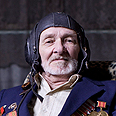
Motovitch, 88, Ashkelon, bombed Japan, Korea
Photo: AP
Ahead of Victory Day, marked May 9, the Knesset honored Red Army veterans Tuesday. Once a year, Israel's Jewish war veterans don suit jackets and uniforms dripping in Red Army medals,
the shiny bronzes and silvers pinned to their chests in tight rows like armor.
About 500,000 Jews served in the Soviet Red Army during World War II. Most of those still alive today – about 7,000 – are said to live in Israel.
Related stories:
- Holocaust survivors meet US liberators
- Saying 'never again' at Mauthausen
- Celebrating grandpa's bar mitzvah
Every year on Victory Day, they parade in uniform throughout Israel to celebrate Nazi Germany's surrender to the Soviet Union.
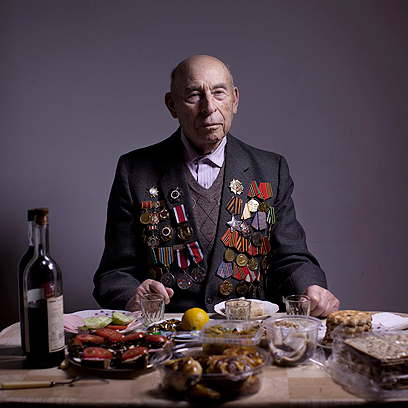
Boris Ginsburg, Ashdod (Photo: AP)
Afterward, they return home to their modest apartments, where some tick off the days in solitude and poverty.
"The ceremonies are beautiful. People like to come and say nice words. But nice words don't put food on your plate," said Abraham Michael Grinzaid, 87, head of an association of Soviet war veterans. "The rest of the year, no one thinks of us."
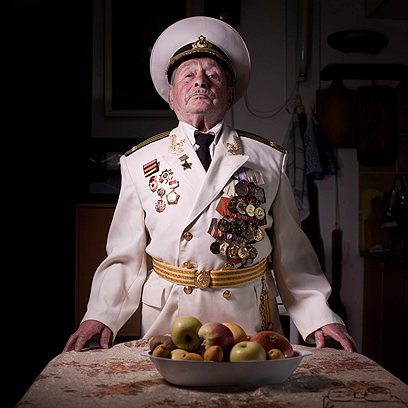
Yaakov Vilokovitch, 90, Ashdod (Photo: AP)
About 1.5 million Jews fought in Allied armies, including 500,000 in the Red Army, 550,000 in the American army, 100,000 in the Polish army and 30,000 in the British army, according to Israel's Holocaust museum Yad Vashem.
Some of those who fought in the Red Army served in the highest levels of command. About 200,000 Soviet Jewish soldiers fell on the battlefield or into German captivity. Those who survived built families and careers in the Soviet Union, until the Communist regime collapsed and many of them ended up in Israel.
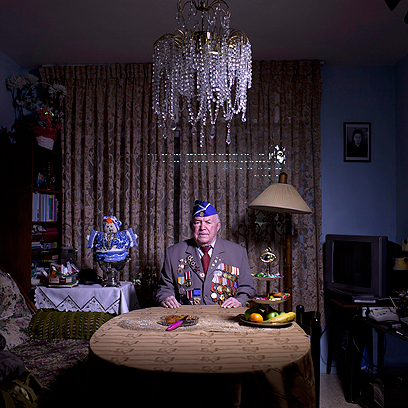
Michael Sanler, 93, Jerusalem (Photo: AP)
They formed a veterans' association, opening 50 chapters across the country. Today, most of them are nearly 90 years old, but they gather regularly for lectures and concerts. Some sing in the 42 veterans' choirs nationwide.
Israel is home to the world's largest population of Holocaust survivors. Memorials to Holocaust victims and underground partisans are aplenty. But only in recent years has the Jewish state begun to salute its Jewish war veterans.
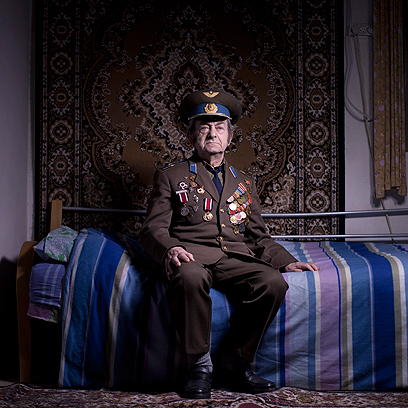
Aharon Kavishner, Ashdod (Photo: AP)
That's mostly because many of the veterans immigrated just two decades ago and key war archives are only now being opened, allowing researchers to discover the full extent of Jewish soldiers' role in fighting the Nazis, said Red Army scholar Yitzhak Arad.
It wasn't until last year that Israel erected its first monument to Soviet Jewish soldiers who served in WWII. A museum dedicated to Jewish Allied fighters is still under construction.
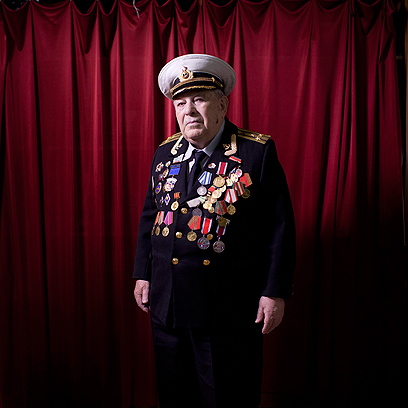
David Rivlitsiki, Jerusalem (Photo: AP)
Grinzaid, of the veterans association, complained that some Soviet war veterans in Israel receive government stipends amounting to just $50 a month, a pittance compared to the financial support Israeli Holocaust survivors receive.
But Roman Yagel, the head of another group of Soviet veterans, countered that veterans receive generous Israeli support. He accused Grinzaid of securing stipends for undeserving veterans who did not fight on the battlefield with weapons in hand - one example of bitter political infighting within the Soviet veteran community.
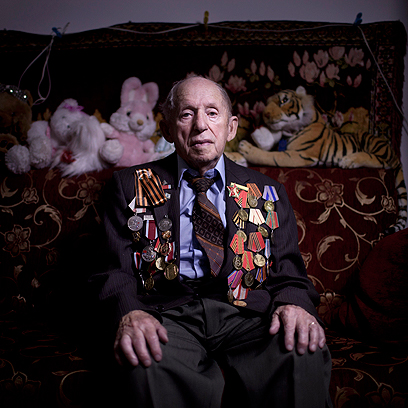
Yitzhav Tsodnovski, Ashkelon (Photo: AP)
Holocaust survivors are frequently invited to speak about the horrors they experienced. But Soviet war veterans arrived in Israel as pensioners and most never learned Hebrew so few Israelis know their stories.
Grinzaid was 17 when he enlisted in the Red Army. He was a paratrooper and served in an intelligence unit, earning five medals for his participation in battles across Europe. When Russian President Vladimir Putin came to Israel last year, he shook his hand.
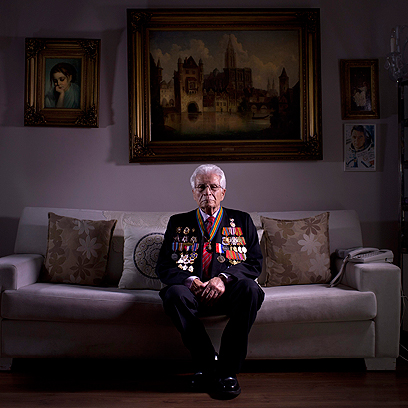
Shalom Scopus, 88, Tel Aviv (Photo: AP)
Another Soviet veteran, Matvey Gershman, 87, helped liberate the Majdanek concentration camp in Poland. He remembers walking past storerooms filled with women's hair and children's shoes.
Suddenly, he stumbled upon a woman sitting and crying.
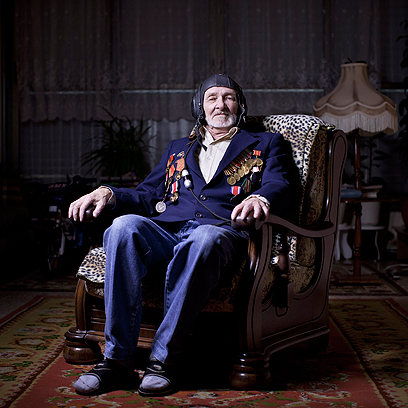
Nahum Motovitch, 88, Ashkelon (Photo: AP)
"I said, 'Grandmother, why are you crying? It's all over,'" Gershman recalled. "She lifted her head, looked at me, and said, 'I am 20 years old.'"
Gersham used to march in Israel's annual Victory Day parade before he had heart problems.
One year, he walked to the parade with his daughter and grandson, wearing his navy blue uniform featuring a cascade of medallions. Israeli teenagers on the street pointed at him and laughed.
"They treated him like he was a clown," said his daughter, Rimma. "He doesn't want to go out with these medals on anymore. He's embarrassed. They don't know what it is at all."
- Receive Ynetnews updates
directly to your desktop















